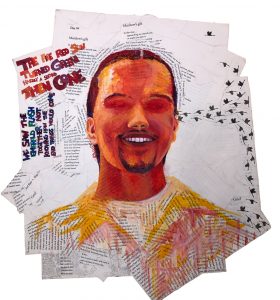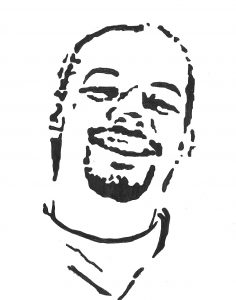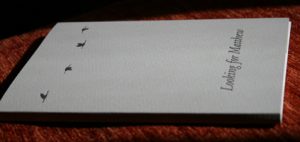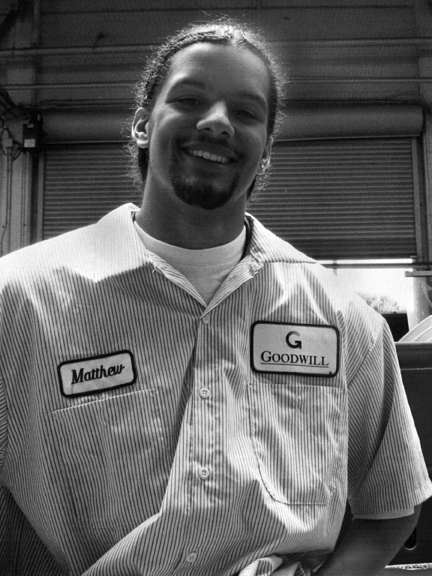 On January 31, 2019, Anthony Ginez, the Mitigator for Community Resources Initiative, who is working on Luis Rojas’ case with defense attorney Alexandria McClure and Harriet, the CRI videographer, came to Portland to interview me. They had interviewed members of Luis’ family and they wanted to talk with me again. They were making a presentation for the Federal Department of Justice, explaining why the death penalty was not appropriate for Luis.
On January 31, 2019, Anthony Ginez, the Mitigator for Community Resources Initiative, who is working on Luis Rojas’ case with defense attorney Alexandria McClure and Harriet, the CRI videographer, came to Portland to interview me. They had interviewed members of Luis’ family and they wanted to talk with me again. They were making a presentation for the Federal Department of Justice, explaining why the death penalty was not appropriate for Luis.
During the course of the afternoon, as Anthony and Harriet posed questions to me about my relationship with Matthew, I was forced to think about our entire history, about the actual limits of our connection when he was alive and how his murder and my sense that I was actually, quite literally, responsible for his death, allowed me to become aware of how centrally important Matt had become to my entire life. You might say that Matt’s murder, the finality of his death and my sense of responsibility surrounding it, pushed him to the very center of my life, where he now sits, determining, in some sense, all of my actions—my intention to honor his short life by living absolutely the best life I am capable of living, and that, of course, now centers on these three young men—Luis, Josue and Eddie—who have been charged with his murder. So in his death, in the finality of that condition, his absolute absence, he has become much more central to my life than he was when he was alive.
The question, then, that I raise in this short essay is, “How can we turn this tragedy, this grievous error, this taking of Matt’s life, this robbing his sons of their father—forever—how can we turn this tragedy to good?
This extended essay first appeared on Justice Conversation and has since been published by Fernwood Press under the title, “What is Justice?” It can be purchased in printed form here: http://www.barclaypressbookstore.com/What-Is-Justice.html
See also:
Matthew I: What is Justice
Matthew II:
Matthew III:
Matthew IV: Compassion –a radical critique

Pen and Ink portrait of Matthew by Leslie Denham.
Acknowledgments
As is the case with anything I write, poetry or prose, none of which is an any sense original but is a gathering and a harvesting of thoughts and ideas that are in the world around me, that seem to me to be important, that need to be expressed within the context of my own personal experience and then shared as widely as I can manage, hoping, always, to be effective in encouraging others to live in this manner—examining their own experience critically, articulating the discoveries and sharing their observations with others as widely as is possible—for only in this way are we able to see each other as human. Of course, the other part of this kind of life is listening—listening with an open and non-judgmental heart.
The debts I owe are well beyond what I can list here but let me express my gratitude for what I have learned from the three mothers of my children and what I have learned and continue to learn from my very own children. None of my present life would be possible without the love and support of my oldest and dearest friend, Sean Morris, thirty years my junior, yet one who has taught me how to live. Sean read the current manuscript and offered his critique that improved it considerably. Chris Morrissey and Dea Cox and Bruce Murphy also read and critiqued the manuscript.
To Kim Vanderheiden, Bettina Pauly and Mitsuko Baulm, my colleagues at Painted Tongue Press in Oakland, California where I worked for years before my retirement and my move to Portland, Oregon, I owe a tremendous debt of gratitude for all the mentoring, teaching me how to be a letterpress printer, and for all the support around the original letterpress printed Looking for Matthew, whose edition of clothbound and boxed copies was Bettina Pauly’s idea—an idea that she and Mitsuko Baum, both of whom are accomplished book artists, realized. They made fifteen copies of the fifty-five that were printed.

“Looking for Matthew” written and letterpress printed by Bill Denham
For my life, I am grateful to my mother and father who brought me into this world and gave me the best that they had to offer and I am in very significant ways a combination of the two of them. And to my older brothers, John and Bob, who have stood by me faithfully throughout my struggling journey, always supportive, never harsh nor critical, but patient and kind, I express my deepest gratitude for your presence in my life.
And finally to the incredible group of conscious men of the Redwood Men’s Center in Santa Rosa, California, whom I first encountered in the year 2000 at their annual conference, under the redwoods at Camp Gualala, where Robert Johnson, the Jungian psychologist, gave me a way to understand my life in terms other than the “good and evil” of my childhood and where Doug Von Koss spoke Mary Oliver’s poem, The Journey, on Memorial Day in the Temple of Melodious Sound that set me on my own journey of becoming a poet, once more.
And finally to you my readers, I owe everything to you, for without you I would be a lone voice crying in the wilderness. With you we can move together toward realizing our own human potential to the best of each of our abilities.

Matthew Avery Solomon
March 3, 1985 – September 4th, 2008